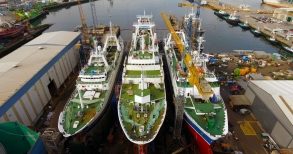The MATES Pilot Experiences are vital components of the overall strategic design of the project. These experiences are composed of a series of activities which align with the priority lines of action and training needs identified.
Target beneficiaries include students, teachers, trainers, skilled workers and those who have recently joined the workforce. While it was originally hoped that the Pilot Experiences would include a mix of e-learning courses, hackathons, upskilling workshops, careers seminars and more, the consortium have had to make several adaptions in response to COVID-19. As such, some of the planned face-to-face activities are now taking place online.
The outcomes of the Pilot Experiences will provide vital knowledge for bridging the maritime skills gap and increasing the sector’s overall competitiveness and attractiveness. Insights will feed directly into the long-term action plan, which will be developed by MATES, informing policy recommendations and best practices.
All of the MATES Pilot Experiences are published on the European Marine Biological Resource Centre’s Marine Training Platform. In order to boost the development of Blue Careers, the EMBRC offers an overview of current Marine and Maritime training. It is a supporting framework to foster new Blue Growth training initiatives and supports the exchange of best practice for Blue Career focused training.
If you would like to receive updates on the Pilot Experiences and general MATES updates, you can subscribe to news by registering here.
-
![Definition of New Occupational Profiles]()
Definition of New Occupational Profiles
The main goal of this Pilot Experience was to define the new occupations emerging from the evolving technologies in the Offshore Renewable En...
Read more... -
![ED2MIT: Education and Training for Data Driven Maritime Industry]()
ED2MIT: Education and Training for Data Driven Maritime Industry
ED2MIT, developed a series of training courses for topics related to data literacy, data management and modern platforms for digitalisation i...
Read more... -
![MOOCs on Industry 4.0 and the naval sector]()
MOOCs on Industry 4.0 and the naval sector
This Pilot Experience aimed to address the common problem of the mismatch of skills acquired through education and the needs of companies. It...
Read more... -
![Freeboard]()
Freeboard
The aim of Freeboard is to build a boat model using a block assembly process, in order to reproduce conditions that students will face in rea...
Read more... -
![The Magnus Effect]()
The Magnus Effect
The aim of the Magnus Effect was to build a scale offshore wind jacket, to promote renewable energies, in particular wind and marine energy, ...
Read more... -
![Training Seminar on Additive Manufacturing and Risk Management in the Shipbuilding and Ship Repair Sectors]()
Training Seminar on Additive Manufacturing and Risk Management in the Shipbuilding and Ship Repair Sectors
The aim of the training seminar "Additive Manufacturing and Risk Management in the Shipbuilding and Ship Repair Sectors" was to support the s...
Read more... -
![MOL2: Maritime on the Loop of Ocean Literacy]()
MOL2: Maritime on the Loop of Ocean Literacy
MOL2 aimed to engage educational and training centres with cross-curricular skills related to Shipbuilding and Marine Technologies. ...
Read more... -
![Offshore Renewable Energy Courses]()
Offshore Renewable Energy Courses
The offshore renewable energy courses provided information on the marine energy se...
Read more... -
![Ocean Pro.Tec Lab]()
Ocean Pro.Tec Lab
The Ocean ProTec.Lab was a short-term course on knowledge exchange between workers from traditional sectors (including shipbuilding/ship repa...
Read more... -
![Green Move]()
Green Move
Green Move aims to promote professional mobility (including exchanges and technical visits) of students and workers to encourage the use of g...
Read more... -
![Innovation Manager in Shipbuilding Course]()
Innovation Manager in Shipbuilding Course
The aim of the Innovation Manager in Shipbuilding Course was to attract talent from training centres to the shipbuilding sector by upskilling...
Read more...











